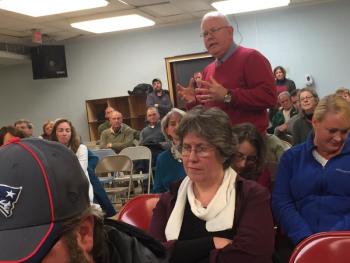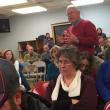School closure hearing brings out many views
 Wiscasset Middle School Principal Bruce Scally speaks at a Nov. 20 hearing on the upcoming referendum on the School Committee’s decision to close Wiscasset Primary School. Thursday’s hearing took place in the middle school’s cafeteria. SUSAN JOHNS/Wiscasset Newspaper
Wiscasset Middle School Principal Bruce Scally speaks at a Nov. 20 hearing on the upcoming referendum on the School Committee’s decision to close Wiscasset Primary School. Thursday’s hearing took place in the middle school’s cafeteria. SUSAN JOHNS/Wiscasset Newspaper
 Wiscasset Middle School Principal Bruce Scally speaks at a Nov. 20 hearing on the upcoming referendum on the School Committee’s decision to close Wiscasset Primary School. Thursday’s hearing took place in the middle school’s cafeteria. SUSAN JOHNS/Wiscasset Newspaper
Wiscasset Middle School Principal Bruce Scally speaks at a Nov. 20 hearing on the upcoming referendum on the School Committee’s decision to close Wiscasset Primary School. Thursday’s hearing took place in the middle school’s cafeteria. SUSAN JOHNS/Wiscasset Newspaper
If no school closes in Wiscasset, Interim Superintendent Lyford Beverage said he wouldn’t be able to look taxpayers in the eye, knowing the impact three schools will continue to have on a town that doesn’t have enough students to fill to them.
“I think it would be a travesty not to close a school and save the taxpayers some money,” he said.
Beverage made his remarks at a public hearing Nov. 20 on next month’s referendum to decide if Wiscasset Primary School closes. About 70 people turned out for Thursday’s hearing in the middle school cafeteria, nearly three weeks before voters head to the polls on Dec. 9.
Opinions differed Thursday night on several fronts, including whether the primary or middle school is more secure for lockdowns, and how the primary school’s students would adjust to a move.
Both retired Wiscasset Middle School principal Linda Bleile and her successor Bruce Scally maintained that even the youngest students could handle a switch in schools. Change comes more easily to children than to their parents, Scally said.
“A year from now, the students will be fine,” Bleile said. It isn’t the building that matters, she said. “It’s what happens in the building.”
As for security, Bleile said the middle school can be locked down in 12 to 15 seconds. She described the primary school’s design as more open. She loves the school, but the middle school is probably safer, she told attendees.
Wiscasset Primary School Principal Mona Schlein disagreed, saying the primary school can also be locked down very quickly. She cited issues she observed on a recent public tour of the middle school, such as the grounds having areas where students could hide.
“The primary school seems to serve students’ needs much more effectively and efficiently,” she said.
Asked if the schools’ merger would mean fewer employees, Beverage told the crowd that might happen, but that he would hope any job cuts could be done through attrition.
Some residents wondered if selectmen would be willing to propose tapping the town’s reserves again next year, if the town still has three schools open; and how much money the town could get for selling whichever school closes.
“We have waterfront property,” resident Mike Blagdon said about the middle school lot on the Sheepscot River.
Selectmen’s Chairman Pam Dunning said the town received the middle school property for educational use so she didn’t know if its use could be changed; and she couldn’t speak to the issue of offsetting taxes next year since she will end her service on the board when her current term runs out in June, Dunning said.
While Schlein and some residents have cited the primary school’s nearness to Morris Farm as a plus, some of Thursday’s speakers suggested expanding the middle school’s use of its waterfront as a marine lab, for middle and primary grades or for the high school if its students ever move there. A focus on marine studies could attract more students to Wiscasset, some residents said.
Several residents brought up a town-funded, 2008 report that favored closing the middle school rather than putting millions of dollars into it. They wanted to know if the committee took that report into consideration when deciding which school to close. Committee members said they had reviewed the report. Its large cost projection to keep the middle school open was based heavily on construction that was not being proposed now, School Committee Chairman Steve Smith said.
“I don’t think that applies to this bare-bones thing that we’re trying to do,” he said.
Smith asked residents to trust that the committee is making decisions in the interest of students. That way, the committee can move on to improvements in technology and other areas to benefit education, he said.
“There are so many things that we want to do (but) that we can’t even start to do now.”
Event Date
Address
United States






















